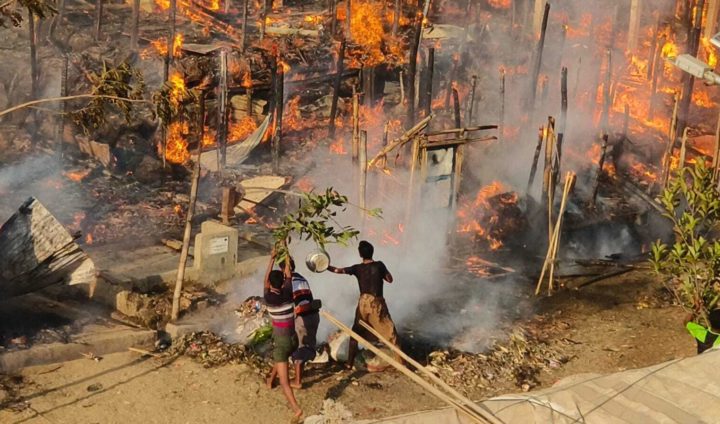It is tragedy upon tragedy for the Rohingya refugees living in Bangladesh’s overcrowded and underfunded site in Cox’s Bazaar. A vast inferno that took hold on Sunday has caused considerable damage to shelters and the displacement of many thousands who were already displaced as a result of the Myanmar regime’s decades-long genocidal policies.
While the cause of the horrific blaze at the Balukhali refugee camp has yet to be ascertained, it is understood that around 12,000 Rohingya refugees have once again been displaced. It is unclear as to where these refugees will be re-housed.
Already living in challenging conditions with Bangladeshi government funding unable to adequately support the millions who have fled conflict-ridden Myanmar, the deputy refugee commissioner, Shamsud Douza, said that the Sunday afternoon fire has caused the destruction of around 2,000 dwellings, most of which were made of bamboo and tarpaulin.
In addition to the gutting of numerous residential buildings, over 35 mosques and 21 learning centres were also destroyed.
Rohingya are some of the most oppressed Muslims
An ethnic group that is native to Myanmar, successive regimes have attempted to paint the Rohingya as “Bengalis” who migrated from neighbouring Bangladesh. This pejorative and false line has been utilised with great efficiency in the past fifty years.
In 1978, the country’s military launched “Operation Dragon King”. This caused many Rohingya to become refugees in their own country. A large number fled to Bangladesh as a result.
Since then, there have been further operations targeting the Rohingya. One of the most recent is “Operation Clean and Beautiful Nation”, which was launched between 1991-92.
Renewed crackdown in 2017
Since 2017, there has been a renewed pursuit of military-backed abuses against the Rohingya, with gang rape, torture, murder, and the burning of entire villages with people trapped in their homes. This has largely taken place with the tacit approval of Myanmar’s bigger ethnic groups.
At the same time, Bangladesh has struggled to support the periodic influxes in Rohingya refugees, with current estimates suggesting that around 740,000 have crossed the border since the 70s. A total of one million Rohingya are believed to be refugees in Bangladesh.
Helping our Rohingya brothers and sisters
Of course, it is necessary to report on and cover such atrocities when they occur. However, it is perhaps even more vital that we, as Muslims, rush to the aid of our brothers and sisters in difficulty.
For the persecuted Rohingya people, there are extremely limited options available, should they choose to flee Myanmar and cross into Bangladesh or other neighbouring states, or decide to stay put.
Abu Darda (radiy Allāhu ‘anhu) reported that the Messenger (ﷺ) said,
“No Muslim servant supplicates for his brother behind his back, but that the angel says:
‘And for you the same.’”
While charitable organisations continue to offer direct support, with the critical work undertaken by volunteer aid workers, doctors, and other professionals, we should never forget the power of du’ā. This is something we should do in abundance.
In remembering other Muslims who are going through hardships, we may be opening up a means of getting closer to Allah (subḥānahu wa ta’āla)!
Source: Islam21c







